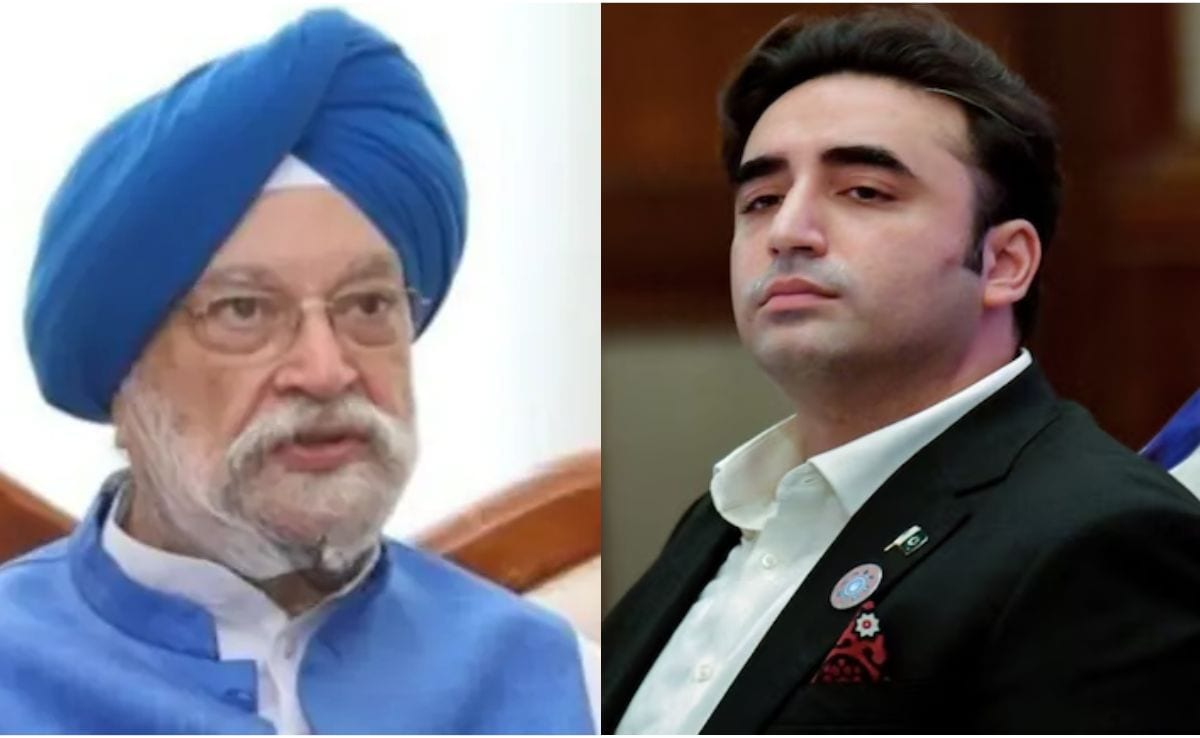Hardeep Singh Puri’s Retort to Bilawal Bhutto-Zardari’s Provocative Remarks Sparks International Debate
New Delhi: The diplomatic tensions between India and Pakistan have reached a boiling point following sharp remarks exchanged between Union Minister Hardeep Singh Puri and Pakistan Peoples Party (PPP) chairman Bilawal Bhutto-Zardari. This latest escalation comes in the wake of the tragic Pahalgam terror attack on April 22, 2025, which claimed the lives of 26 individuals, predominantly tourists, and has pushed the Indus Waters Treaty (IWT) to the forefront of discussions.
Union Minister Puri’s comments were a direct response to Bhutto-Zardari’s inflammatory rhetoric at a public rally in Sukkur, Sindh. The PPP chairman made a bold claim, stating, “The Indus is ours and will remain ours – either our water will flow through it, or their blood.” These words have not only drawn ire from Indian officials but have been interpreted as a serious threat, further complicating the already tense relations between the neighboring countries.
Who is Involved?
The major players in this escalating conflict include Bilawal Bhutto-Zardari, the chairman of the PPP and son of former Pakistani Prime Minister Benazir Bhutto, and Indian Union Minister Hardeep Singh Puri, who has taken a firm stance against Pakistan’s threats. The events are unfolding against the backdrop of the Pahalgam terror attack, which, according to intelligence sources, is linked to the Pakistan-based terrorist organization Lashkar-e-Taiba.
What Happened?
In response to Bhutto-Zardari’s aggressive comments, Puri stated, “I heard his statement. Tell him to jump somewhere in water. Well, how will he when there will be no water?” He urged the public not to dignify such statements. Puri further asserted that the Pahalgam incident was a direct cross-border terrorist attack that will not go unanswered. He stressed India’s resolve to take decisive actions against threats emanating from Pakistan and indicated that this is just the beginning of a broader response, as articulated by Prime Minister Modi.
Where is This Taking Place?
The exchange of threats and statements is taking place on both sides of the border, specifically in India and Pakistan. Puri made his remarks from Mohali, India, while Bhutto-Zardari spoke at a rally in Sukkur, Sindh province. The gravity of the situation has reverberated across international borders, drawing the attention of global leaders and media outlets.
When Did This Occur?
The verbal confrontation began immediately following the Pahalgam terror attack on April 22, 2025. As the situation continues to develop, it has become increasingly clear that the incident has reignited long-standing disputes regarding water rights as outlined in the Indus Waters Treaty, originally signed in 1960.
Why is This Important?
The escalated tensions over the Indus Waters Treaty highlight both nations’ deep-rooted disagreements and their historical struggle for water rights. The treaty has been crucial in regulating the water distribution of the Indus River system, which is vital for both countries. As per the report by[The Economic Times](https://economictimes.indiatimes.com/news/politics-and-nation/india-to-hit-back-hard-at-pakistan-for-terror-attack-in-pahalgam/articleshow/82345678.cms), the stakes have reached new heights as India has now suspended the treaty in response to the Pahalgam incident, prompting Pakistan to retaliate by halting the Simla Agreement and other bilateral accords.
How is This Linked to Broader Issues?
The ongoing dialogue regarding the Indus Waters Treaty is not merely a matter of water rights—it encompasses issues of national security, terrorism, and the geopolitical landscape of South Asia. Puri pointed out that the Pahalgam tragedy represents state-sponsored terrorism, and he reiterated that Pakistan must face the consequences of its actions, as they represent a fundamental threat to peace and stability in the region.
In a further twist to the story, Puri commented on a disturbing throat-slitting gesture made by Colonel Taimur Rahat, who is associated with the Pakistan Army, during a recent event in London. Puri condemned this act as a reflection of the ongoing state-sponsored terrorism, stating, “We have reached a point where they will have to pay a price.”
Pakistan’s Prime Minister Shehbaz Sharif also addressed the Pahalgam incident, speaking at a graduation ceremony at the Pakistan Military Academy in Kakul, Khyber-Pakhtunkhwa province. He expressed a desire for a neutral investigation into the attack, advocating for an end to the “perpetual blame game.”
As tensions rise, Pakistan has taken various measures, including suspending all trade activities with India and closing its airspace to Indian airlines. Islamabad has also issued stern warnings, claiming any attempt by India to divert waters covered under the Indus Waters Treaty would be viewed as an “act of war.”
The Path Ahead: Diplomatic Solutions or Further Escalation?
As both nations stand firm in their positions, the question remains whether diplomatic solutions can be reached or if the situation will devolve into further escalation. The international community watches closely, concerned about the potential for conflict in a region already fraught with tension.
The Indus Waters Treaty has, for decades, served as a framework for managing water distribution between India and Pakistan, but with current hostilities, its future hangs in the balance. As India continues to respond to threats, it underlines the importance of dialogue to prevent further conflicts that could disrupt the delicate balance of the South Asian geopolitical landscape.
For more insights on the water insecurity issues in South Asia, read about[India and Pakistan’s Water Wars](https://www.aljazeera.com/news/2023/10/1/india-and-pakistan-water-wars-will-the-indus-waters-treaty-survive) and the implications of the recent terror attacks on regional stability.
DISCLAIMER
We have taken every measure to ensure that the information in this article and on our social media platforms is accurate, verified, and obtained from reliable sources. For feedback or complaints, please contact us at info@hamslive.com.


